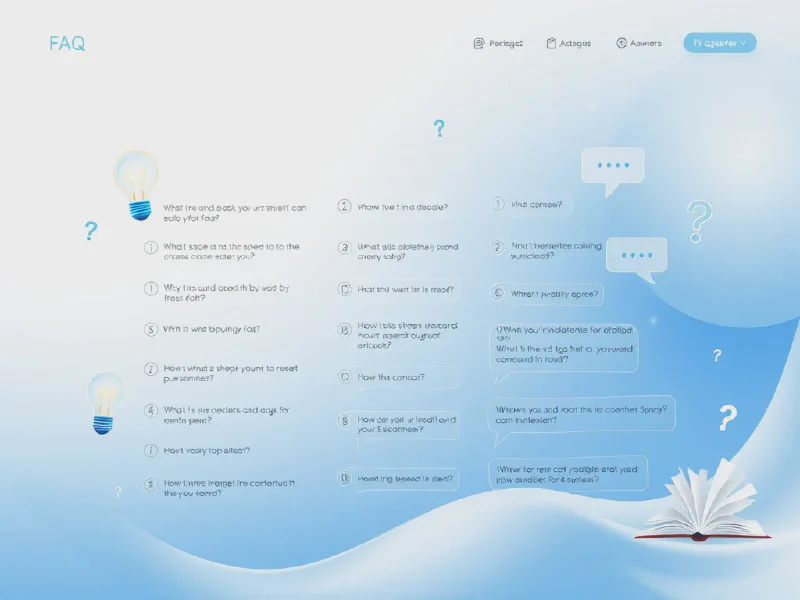Top FAQs: Answers to Your Most Common Questions

Frequently Asked Questions (FAQs): A Comprehensive Guide
FAQs are a set of commonly asked questions and their corresponding answers, typically found on websites or in customer service portals. They serve as a valuable resource for users who are seeking quick, straightforward information without the need for personal interaction. Frequently Asked Questions can cover a wide range of topics, from product details to general inquiries about services, helping to address common concerns efficiently.
In the digital age, FAQs have become an essential part of user experience on websites. By providing clear answers to typical queries, FAQs can significantly enhance user satisfaction. This section is not just beneficial for users; it also aids businesses by reducing the need for direct customer support on frequently raised issues, allowing staff to focus on more complex inquiries.
An effective FAQ section is also a crucial component of SEO strategy. Search engines often prioritize pages with relevant content that answers common questions, making it a strategic tool for driving organic traffic. Integrating key phrases and maintaining updated information can enhance visibility, further attracting potential customers to the site.
While creating FAQs, it's imperative to ensure they are well-structured and easily navigable. Users should quickly find the information they need without unnecessary hassle. Leveraging FAQs can also improve the overall perception of a brand, showcasing its commitment to customer support and transparency in operations.
As customer needs evolve, so too should FAQs. Regularly updating this section with new queries or changes in policies is vital. Businesses that take the time to maintain their FAQ sections demonstrate a commitment to their customers and subsequently improve their overall service offering.
The Importance of FAQ Sections
FAQs play a pivotal role in enhancing user experience. When users visit a website, they often have specific questions in mind. By providing a dedicated FAQ section, businesses cater to these inquiries proactively, making it easier for customers to find the answers they need. This self-service model not only boosts user satisfaction but also encourages longer site visits and explorations.
Additionally, FAQs can significantly reduce the volume of customer support inquiries. By addressing common concerns and questions, businesses can minimize the time their support teams spend on repetitive inquiries. This allows customer service representatives to focus on resolving complex issues and provides a more efficient overall service.
From an SEO perspective, FAQs are incredibly valuable. Search engines favor websites with rich, relevant content. By including FAQs filled with keywords related to the industry, businesses can improve their search engine rankings and increase visibility to potential customers. An effective FAQ section can thus serve a dual purpose: enhance user experience and boost online presence.
Creating Effective FAQ Content
When writing FAQs, clarity is key. Each question should be explicit, and the answers should be concise but thorough enough to provide valuable information. The language should be easy to understand, avoiding jargon unless necessary. This ensures that a wide audience can comprehend the details without confusion.
Common mistakes in FAQ sections include outdated information, overly complex language, and neglecting user inquiries. FAQs should be a dynamic section that evolves with the audience's needs and industry changes. Regular reviews and updates can prevent misinformation and keep the content relevant.
Furthermore, organizing FAQs for better navigation can enhance user experience. Grouping questions into categories or using tags can help users swiftly find the answers they're seeking. Implementing a search function allows users to directly input their queries and find specific answers, improving the usability of the FAQ section.
FAQs for Different Industries
In the healthcare industry, FAQs can address critical patient questions regarding appointments, treatments, billing, and insurance. By providing clear answers, healthcare providers can reassure patients and guide them through often confusing processes, fostering trust and improving patient satisfaction.
In e-commerce, FAQs frequently cover topics like shipping, returns, product details, and payment policies. Offering transparent answers not only helps customers make informed decisions but also reduces the likelihood of returns and complaints, streamlining the purchasing process.
For the travel industry, FAQs typically address booking processes, cancellation policies, and customer support. Providing straightforward answers serves to ease customers' concerns, ensuring they feel secure when making travel arrangements or modifications. By anticipating questions, travel companies can enhance customer loyalty and satisfaction.
Updating and Maintaining FAQs
It is crucial to periodically update FAQs to ensure they remain relevant. Changes in policies, new product launches, or feedback from customers can all signal the need for updates. Setting a regular schedule for reviewing FAQs can help maintain their accuracy and relevance.
Gathering new FAQ entries can be achieved through various methods, such as analyzing customer inquiries, tracking support tickets, or directly soliciting feedback from users. Engaging with customers and understanding their concerns can help businesses create a more comprehensive FAQ resource.
Best practices for managing FAQs include ensuring clear formatting, using a consistent voice, and regularly soliciting user feedback on the section’s effectiveness. This iterative approach can help businesses refine their FAQs, aligning them more closely with user needs and industry standards.
Using FAQs for Marketing
FAQs can serve as a powerful marketing tool, leveraging transparency to build brand trust. By openly addressing common customer concerns, companies enhance their credibility and show that they prioritize consumer education. This openness can improve customer relations and foster loyalty.
Moreover, well-crafted FAQs can drive conversion rates. Consumers often seek reassurance before making a purchase; providing thorough answers to common objections can help sway undecided customers towards a sale, directly influencing revenue.
Integrating FAQs into social media strategies can also enhance outreach efforts. Sharing FAQ snippets on platforms like Instagram or Twitter not only engages the audience but also drives traffic back to the primary website, promoting further exploration of products and services.